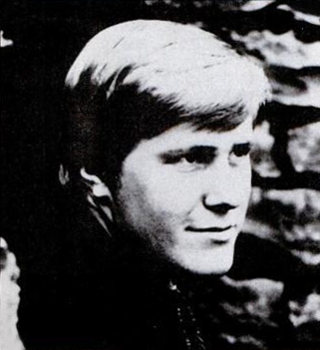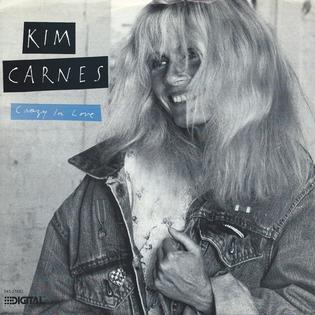Related Research Articles

Harold Lloyd Jenkins, better known by his stage name Conway Twitty, was an American singer and songwriter. Initially a part of the 1950s rockabilly scene, Twitty was best known as a country music performer. From 1971 to 1976, Twitty received a string of Country Music Association awards for duets with Loretta Lynn. He was inducted into both the Country Music and Rockabilly Halls of Fame.

"Three Times a Lady" is a 1978 song by American soul group Commodores for their album Natural High, written by lead singer Lionel Richie. It was produced by James Anthony Carmichael and Commodores.

My Blue Ridge Mountain Boy is the fourth solo studio album by American singer-songwriter Dolly Parton. It was released on September 8, 1969, by RCA Victor. The album was produced by Bob Ferguson. It peaked at number six on the Billboard Top Country Albums chart, Parton's first solo top ten, and number 194 on the Billboard 200 chart. The album spawned three singles: "Daddy", "In the Ghetto", and the title track. "Daddy" was the most successful, peaking at number 40 on the Billboard Hot Country Songs chart.

"It's Only Make Believe" is a song written by drummer Jack Nance and Mississippi-born singer Conway Twitty, while they were touring across Ontario, Canada in 1958. Twitty was a relatively unknown rock n' roll singer at the time, and this song was his first hit, reaching No. 1 on the Billboard chart in November 1958 for two weeks.

Anita Renee Cockerham, known professionally as Anita Cochran, is an American country music singer, songwriter, and guitarist. She has released two albums for Warner Bros. Records Nashville and one for Straybranch Records. Cochran is best known for her late 1997-early 1998 single "What If I Said", a duet with Steve Wariner that reached the number-one position on the Billboard Hot Country Songs charts.

"Hello Darlin'" is a song written and recorded by American country music artist Conway Twitty. It was released in March 1970 as the first single and title track from the album Hello Darlin. The song was Twitty's fourth No. 1 song on the Billboard magazine Hot Country Singles chart. The song spent four weeks atop the Billboard Hot Country Singles chart that summer, and was named the No. 1 song of 1970. Aside from being Twitty's standard concert opener, the song became a country standard as well as his signature song. When performing with Loretta Lynn, Twitty would frequently sing the song directly to Loretta. Twitty's recording was added to the Grammy Hall of Fame in 1999.

John Wesley Ryles is an American country music artist. Ryles recorded a string of hit country songs, beginning in 1968 when he was still a teenager, and continuing through the 1980s. He no longer records as a headline artist but remains active in the music industry as a session musician.
"Ribbon of Darkness" is a song written by Gordon Lightfoot that was released in 1965 as a single by Marty Robbins. The song was Robbins' eleventh number one on the U.S. country singles chart, where it spent one week at the top and a total of nineteen weeks on the chart.
"Fifteen Years Ago" is a song written by Raymond Smith, and recorded by American country music artist Conway Twitty. It was released in September 1970 as the first single and title track from the album Fifteen Years Ago. The song was Twitty's fifth number one on the U.S. country singles chart. The single stayed at number one for a single week and spent a total of 16 weeks on the chart.
"You've Never Been This Far Before" is a song written and recorded by American country music artist Conway Twitty. It was released in July 1973 as the second single and title track from the album You've Never Been This Far Before.
"This Time I've Hurt Her More Than She Loves Me" is a song written by Earl Thomas Conley and Mary Larkin and recorded by American country music artist Conway Twitty. It was released in October 1975 as the first single from the album This Time I've Hurt Her More. The song was Twitty's fifteenth number one country single as a solo artist. The single stayed at number one for a single week and spent a total of ten weeks on the country chart.
"There's a Honky Tonk Angel (Who'll Take Me Back In)" is a song best known for the 1974 recording by American country music artist Conway Twitty, who took it to number 1 on the Hot Country Singles chart. The song was written by Troy Seals and Denny Rice and originally released on Troy Seals' 1973 debut album Now Presenting Troy Seals.
"Linda on My Mind" is a song written and recorded by American country music artist Conway Twitty. It was released in January 1975 as the first single and title track from the album Linda on My Mind. The song was Twitty's 12th number one on the U.S. country singles chart. The single stayed at number one for one week and spent a total of eight weeks on the chart.
"I Can't Believe She Gives It All to Me" is a song written and recorded by American country music artist Conway Twitty. It was released in November 1976 as the first single from the album Play Guitar Play. The song was Twitty's 18th number one on the country chart. The single stayed at number one for a single week and spent a total of 12 weeks on the country chart.
"I'd Love to Lay You Down" is a song written by Johnny MacRae, and recorded by American country music artist Conway Twitty. It was released in January 1980 as the first single from the album Heart & Soul. The song was Twitty's 24th number one on the country chart. The single stayed at number one for one week. The song has sold 300,000 digital copies since becoming available for download.
"Ain't She Somethin' Else" is a song recorded by American country music artist Eddy Raven. It was released in November 1974 as the first single from the album This Is Eddy Raven. The song reached number 46 on the Billboard Hot Country Singles & Tracks chart. The song was written by Bill Rice and Jerry Foster.

"Crazy in Love" is a song by songwriters Even Stevens and Randy McCormick; it was first recorded by Joe Cocker on his 1984 album Civilized Man. The song was covered by American pop artist Kim Carnes in 1988 and released as the second single from her album View from the House. Carnes' version peaked at number 13 on the Billboard Adult Contemporary chart and number 68 on the Billboard Hot Country Singles & Tracks chart.
"The Letter" is a song recorded by American country music artists Conway Twitty and Loretta Lynn as a duet. It was released in June 1976 as the first single from their album United Talent. The song peaked at number 3 on the Billboard Hot Country Singles chart. It also reached number 1 on the RPM Country Tracks chart in Canada. It was written by Twitty and Charles Haney.
"Don't Cry, Joni" is a song written by American country music artist Conway Twitty. He recorded it with his daughter Joni Lee and released it in August 1975 as the single from the album The High Priest of Country Music. The recording was a pop hit peaking at number 63 on the US Billboard Hot 100 chart and number 4 on the Billboard Country Singles chart.
References
- ↑ Whitburn, Joel (2004). The Billboard Book Of Top 40 Country Hits: 1944-2006, Second edition. Record Research. p. 361.
- ↑ "Conway Twitty Chart History (Hot Country Songs)". Billboard.